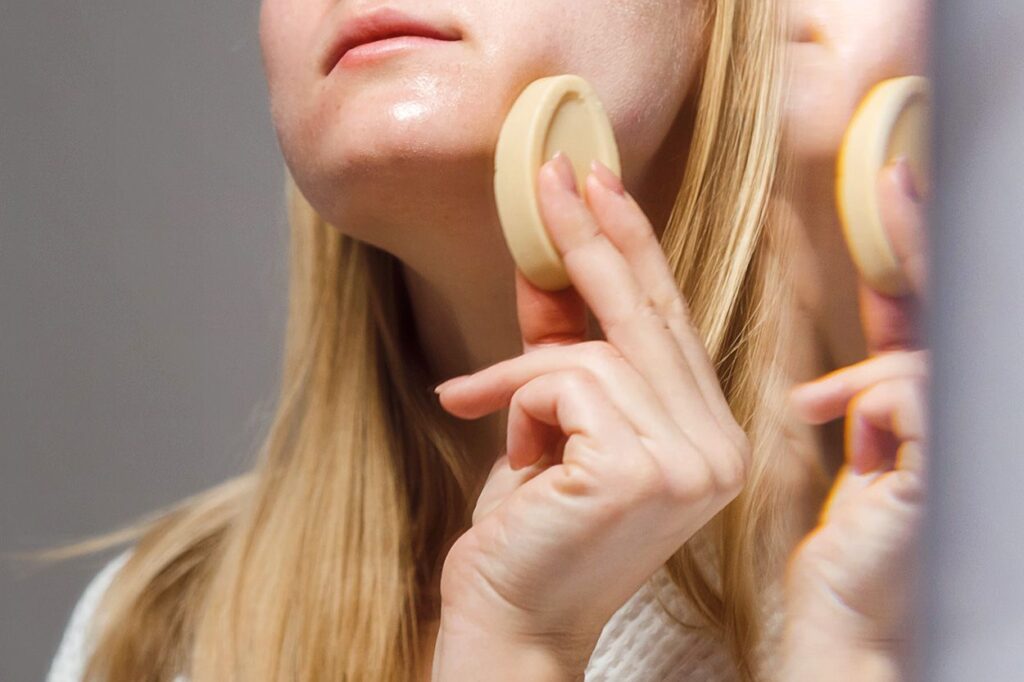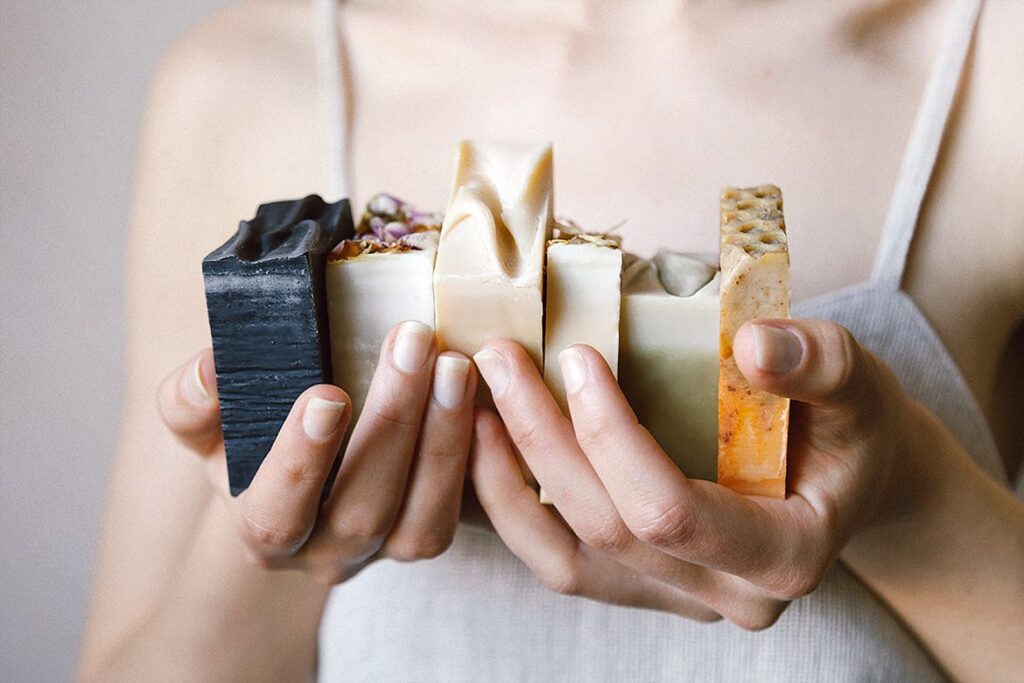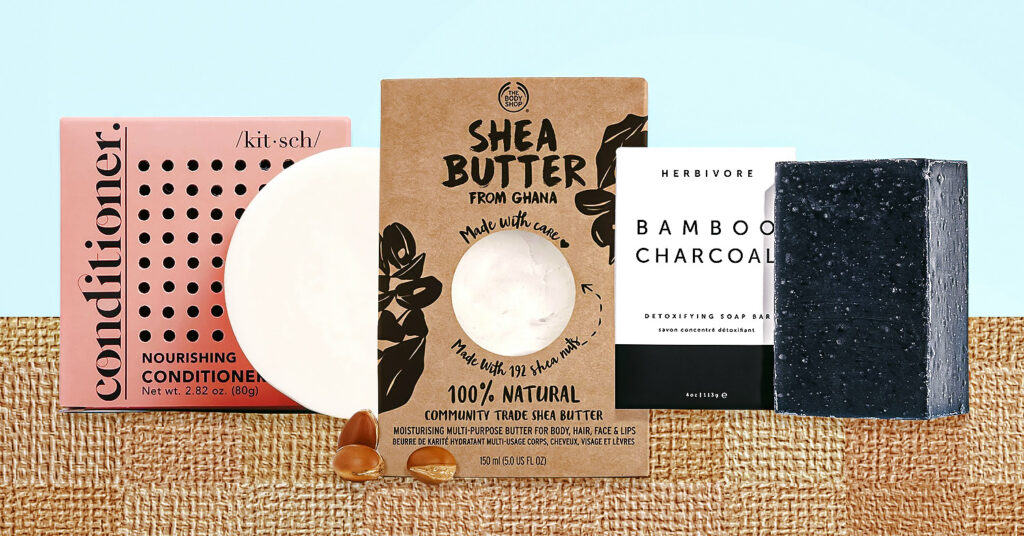If you’ve ever perused a Lush beauty store, you’ll likely remember two things. The first: each shop feels like Willy Wonka’s factory, with bright colors, sweet smells, and bubbling swirls of pastel-colored beauty potions. (All thanks to demos of the brand’s signature bath bombs and bubble bars.) And the second: much of what it has to offer is solid beauty. Shampoo, conditioner, bubble bath, and shower lotion are all compressed into blocks that melt or dissolve.
Lush was an innovator. It was one of the first international beauty brands to feature no-package, solid, sustainable products for the bath and body. The brand’s co-founder, Mo Constantine, invented the shampoo bar after trying to formulate a new bar of soap with cosmetic chemist Stan Krysztal back in the 1980s.
Outside of Lush, the solid beauty market is now growing as consumers try to cut down on plastic use. The beauty industry produces around 120 billion units of plastic every year, making low-waste and zero-waste products an attractive option. A sign of the times, even beauty giant Sephora has started stocking solid beauty options in its European locations.

The growth of solid beauty
There aren’t any official stats on the growth of the solid beauty market just yet, but industry experts are expecting big things as more brands continue to adopt the trend.
As well as Sephora, Garnier has its own line of solid shampoo bars. Unilever’s Love Beauty and Planet and popular brands like Glossier and Drunk Elephant have zero-packaging options. Stephanie Reymond, the founder of beauty-focused technical and marketing consulting agency Effervescience, said: “In Europe, it is estimated that [solid beauty] represents 5% of the cosmetics market, but according to the current forecasts, it will soon achieve a strong growth.”
Sephora’s decision to stock products from Unbottled, a beauty startup that wants to “become the French Lush,” is indicative of a shift in the market. It’s the world’s biggest beauty retailer, with more than 2,700 locations in 35 countries, and it’s renowned for staying ahead of the beauty game. It jumped on trends like “clean” and “organic” beauty as they started to emerge. (Now, the clean beauty market is expected to hit a value of $11.6 billion by 2027.) Unbottled’s founder Sarah Pouchet says that with the help of Sephora, the solid beauty market can start to appeal to the masses and “share the same playground as liquid products.”
Solid beauty is better for the planet, but not just because of the lack of plastic packaging. It cuts down on water use too, something that liquid products rely heavily on. “Liquid body wash, shampoos, and conditioners are made of 80 percent water,” explains cosmetic chemist Kirsty Dobos. “Solid bar formats conserve water and allow for more sustainable forms of packaging, or no packaging at all when sold as loose bars.”

What makes solid beauty so effective?
While it might seem like a new development, Dobos notes that solid beauty is not a modern invention. It harkens back to the most basic form of hygiene, developed centuries ago: the humble bar of soap.
“Cosmetic chemists are looking back to the chemistry and manufacturing of traditional soaps and syndet (an abbreviation for synthetic detergent) bars for inspiration,” she adds. “Historical formulations are being revived and reimagined for today’s consumer.”
According to Dobos, the quality of solid products depends on which ones you buy. When you’re buying a shampoo bar, look for those made with ingredients that will help it to lather, or it could leave your hair feeling dry. “Solid shampoo and conditioner bars are harder to lather and distribute through hair,” she says. “The addition of fats and oils like olive oil and shea butter can help, but better conditioning can be achieved through the addition of ingredients such as behentrimonium methosulfate or cetrimonium chloride, these can actually adhere to the hair fibers.”
While they may sound a little intimidating, the ingredients Dobos is referring to are likely already familiar to you—you’ve probably used them in liquid conditioning products time and time again. They stick to damaged strands, helping to heal and rejuvenate your hair. Behentrimonium methosulfate is an emulsifying wax derived from rapeseed oil. It helps to reduce friction between hair shafts, making your mane easier to manage and detangle. And cetrimonium chloride is a quaternary ammonium salt, which works as an antistatic conditioning agent.
When it comes to cleansing bars for your face, the addition of emollient oils helps to effectively melt away makeup and still leave your skin’s moisture intact. But one important thing to consider with this kind of product is hygiene. “When left in a wet soap dish, soap bars can absorb water producing a gelatinous ‘soap mush’ that can also harbor microorganisms,” explains Dobos. “Traditional soaps have a high pH and are less friendly to microbes, but newer synthetic surfactant-based bars have a more skin-friendly pH. So you’ll want to store these types of bars in a place where they can dry thoroughly between uses.” To keep your solid beauty dry, consider using a sisal soap bag, a cotton pouch, or a loofah soap cushion, which will help to soak up excess water.
Finding the right solid beauty products for you takes a little bit of research and trial and error, but when you find one that you love—stick with it. Not only will it help to reduce the amount of plastic and water in your beauty bag, but it’s also super handy too and great for travel (no risk of leaks!). To help you in your search, we’ve gathered some of the best cruelty-free solid beauty and haircare products on the market in the slideshow above. Plus, we’ve included products to help keep your bars clean, hygienic, and dry.
LIVEKINDLY is here to help you navigate the growing marketplace of sustainable products that promote a kinder planet. All of our selections are curated by the editorial team. If you buy something we link to on our site, LIVEKINDLY may earn a commission.


